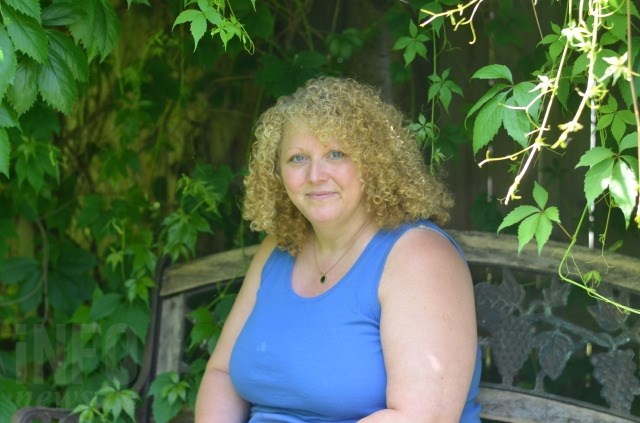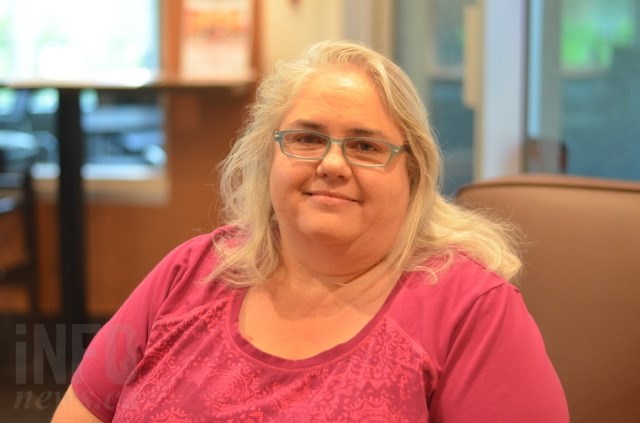
Koren LeFranc relies on the injections to keep her back pain at bay, allowing her to work and enjoy simple pleasures like walking in her garden.
(CHARLOTTE HELSTON - REPORTER / iNFOnews.ca)
June 06, 2018 - 6:30 PM
VERNON - The needle only dips into her spine for a few seconds, but the relief Vernon resident Koren LeFranc gets from the short procedure can last for weeks, allowing her to go to work, stroll around her garden, and shop for groceries. Without it, LeFranc admits she would probably wouldn’t be able to walk around due to her degenerative disc disease.
“The first time I walked out of there and had hip movement for the first time in two years, it was crazy. I came out doing the hula dance,” LeFranc says.
For the past four years, she’s been receiving the treatment — which involves injections of lidocaine into specific trigger points — every couple of months. Due to a sensitivity to pain medications, it’s the only thing that works for her. As a health care worker herself, she also doesn’t want to go to work — including driving there — under the influence of pills.
Thousands of patients in the Interior get the same treatment, or related pain management therapies, from a small cohort of specialized practitioners. But proposed credentialing changes for B.C. physicians mean some doctors could soon be unable to provide chronic pain sufferers like LeFranc with these life-changing interventional treatments.
Dr. Owen Williamson, President of the Pain Medicine Physicians Society of B.C., says new regulations have been put forward by the B.C. Medical Quality Improvement Committee that, if approved, could drastically alter peoples’ access to these therapies.
“At the moment, the Interior Health region is probably one of the better served areas in B.C. in terms of access to pain services. That’s all under threat right now,” Williamson says.
There are 12 general practitioners in B.C. currently providing the treatments, Williamson says, including one in Kamloops, one in Vernon, one in Penticton and a group at the Bill Nelems Pain and Research Centre — which serves 20,000 patients — in Kelowna. All practices are overflowing with patients, he says, adding that one in five British Columbians suffer from chronic pain.
“There is no service provided for pain patients by Interior Health. We saw the need and developed these services,” Williamson says.
While these physicians — some of whom also work as ER doctors and university researchers — have experience ranging from pain medicine fellowships to advanced courses in ultrasound-guided pain procedures, they may not be authorized to perform the procedures if a new credentialing policy goes into effect.
The draft Procedural Pain Management dictionary is one of many such “dictionaries” being developed in B.C. to create common standards for qualifications, training and experience for various medical procedures. The project is a direct response to the 2011 Cochrane Report, which investigated the quality of diagnostic imaging in four health authorities and found gaps in the credential review process. And while physicians like Williamson agree that standardized qualifications are a good thing in the medical field, they believe the pain management dictionary — if left as written — will do more harm than good for patients.
The problem is that general practitioners operating private pain clinics can’t simply go and get the required credentials, Williamson says.
“The qualifications they are asking for are not available to GPs,” he says.
The B.C. Medical Quality Improvement Committee only applies to health authority facilities and not to physicians working in private clinics, he says. Those doctors get their credentials and “privileges” from the College of Physicians and Surgeons of B.C., which Williamson understands will be adopting the dictionary and applying it to non-health authority doctors.
“These GPs who have been trained to do this procedure and have safely been doing them, because they’re not doing them in health authority facilities, and because they can’t be grandfathered in, these physicians will not be able to continue doing those procedures,” he says.
LONGER WAIT TIMES TO ACCESS CARE
If implemented, Williamson says clinics like the Bill Nelems Centre in Kelowna would no longer be able to provide some of their most well-used services. Of the centre’s 20,000 patients, Williamson says at least 50 per cent rely on injection therapies and other treatments their doctors would no longer be considered qualified to perform.
“Those people would have to seek service in the Interior Health services, and there are none,” Williamson says.
He worries that without access to timely care, some patients may turn to pain killers to cope.
“The concern of course is the opioid crisis. We know that Interior Health has the highest death rate in the province. What we’re very concerned about is, if people lose access to services they may put themselves in harm’s way,” Williamson says.
He supports regulation of the pain management field and thinks some sort of quality improvement process is needed — just not the way the committee is planning on doing it.
“The bottom line is nobody wants to put a patient’s safety at risk by having someone do a procedure they’re not trained to do — that's a given. But what sometimes regulators don’t realize is they can put people at risk by denying them timely access to treatment,” he says. “They can say we’ll stop doing this in community facilities and the health authority facilities can take up the slack, but only a few do them and they have long waiting lists.”
PATIENTS CAUGHT IN THE LURCH

Bev Bowers says she'd probably be in a wheel chair if not for the injections she receives from a general practitioner in Vernon.
(CHARLOTTE HELSTON - REPORTER / iNFOnews.ca)
Another patient who, like LeFranc, has degenerative disc disease, says the injections she receives from a general practitioner in Vernon have changed her life.
“I would be completely crippled if I didn’t have the shots. I would have to be in a wheel chair,” Bev Bowers says.
Her other options are prescription pills, but those come with wider side effects and can leave her bedridden anyways. The shots — which don’t cost her a penny because they’re covered by MSP — don’t take care of all of her symptoms, but they allow her to get dressed, shop and go for walks. She doesn’t know what she’d do without them.
The B.C. College of Physicians and Surgeons declined an interview and referred all questions about the pain management dictionary to the B.C. Medical Quality Initiative.
In a written statement provided to iNFOnews.ca, Dr. Martin Wale, executive medical lead for the B.C. Medical Quality Initiative says the dictionary is being developed to ensure a consistent approach to credentialing and privileging of medical staff in B.C.
“Pain management is an evolving multi-specialty practice, requiring complex graduated care,” he says.
He did not directly answer a question about how the changes could affect patients, except to say that the dictionary will provide common standards so that “patients are assured that the quality of care is of a consistently high standard across B.C.”
Prior to the introduction of the provincial dictionaries, processes for privileging medical staff in B.C. were determined by each health authority, and in some cases were delegated to individual facilities, Wale says.
“Privileging was therefore applied unevenly across the health system and vulnerable to the gaps or inconsistencies that could result. Uptake of the dictionaries across the regional health authorities has established a common standard for privileges to practice at all B.C. health authority facilities and programs. The College of Physicians and Surgeons has chosen to adopt the provincial dictionaries to extend these standards across all provincial practice,” Wale says.
The Procedural Pain Management dictionary is currently in draft form and consultation is ongoing. A revised draft will come out in June for further feedback from stakeholders. It is not know when the final version will be published.
To contact a reporter for this story, email Charlotte Helston or call 250-309-5230 or email the editor. You can also submit photos, videos or news tips to the newsroom and be entered to win a monthly prize draw.
We welcome your comments and opinions on our stories but play nice. We won't censor or delete comments unless they contain off-topic statements or links, unnecessary vulgarity, false facts, spam or obviously fake profiles. If you have any concerns about what you see in comments, email the editor in the link above.
News from © iNFOnews, 2018